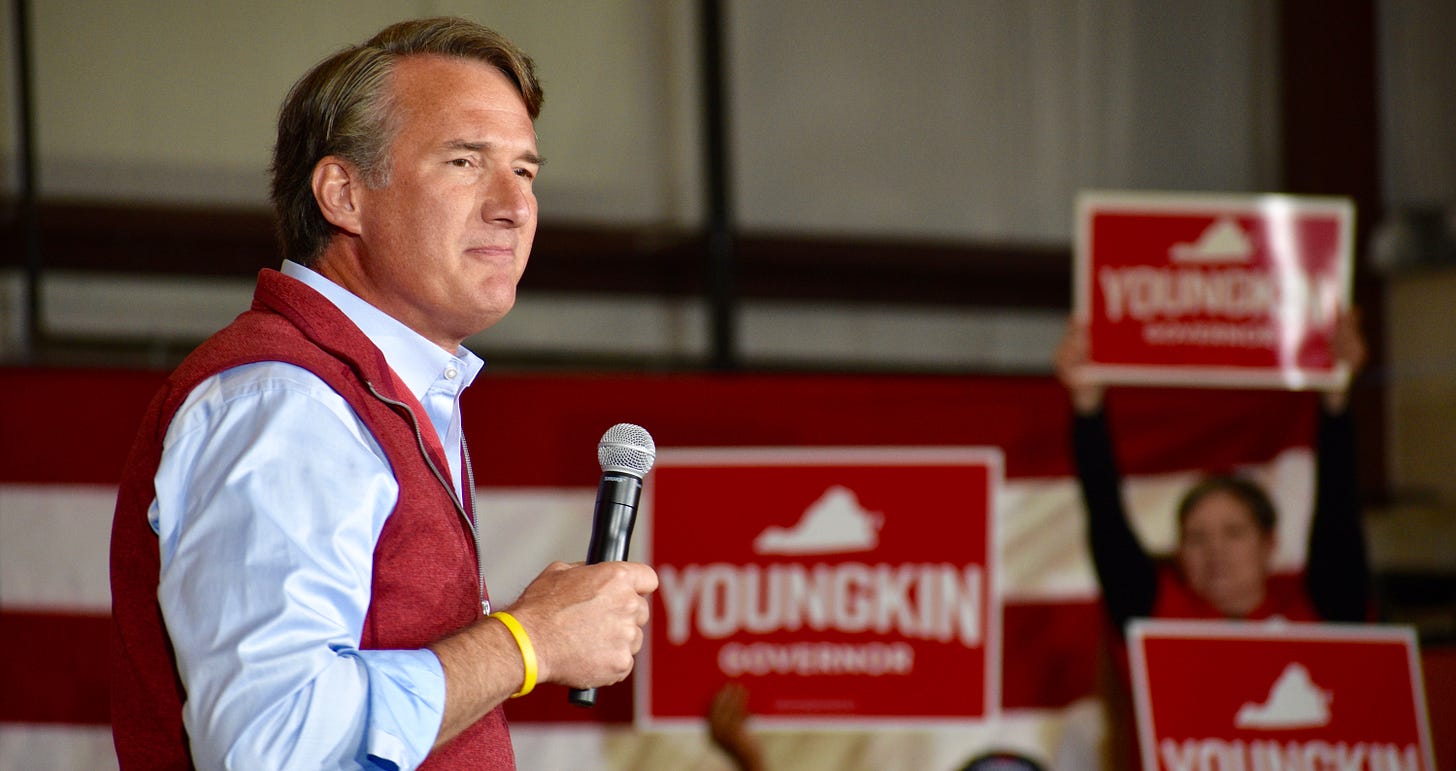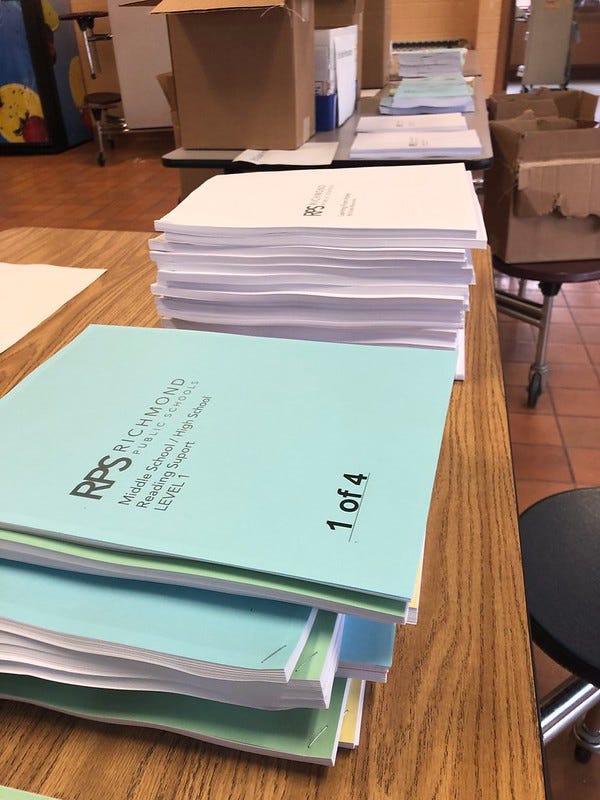Youngkin signs onto a letter opposing ESG
Youngkin signed onto a letter with other Republican governors opposing a rule that allows fund managers to consider environmental, social and corporate governance (ESG) issues for investments
This is a daily newsletter covering Virginia politics from top to bottom. Please consider becoming the ultimate political insider by supporting non-partisan, independent news and becoming a paid subscriber to this newsletter today.
Have a tip? You can reply to this email, or email me directly at Brandon@virginiascope.com
Youngkin signs onto a letter opposing ESG
Governor Glenn Youngkin signed onto a letter with 19 other Republican governors opposing a rule that allows fund managers to consider environmental, social and corporate governance (ESG) issues for investments and shareholder rights decisions.
The letter comes after President Joe Biden on Monday vetoed the legislation passed by Congress that would have stopped fund managers from basing investment decisions on issues like climate change. The governors vowed to take steps at the local level to counteract the rule.

“This month, Congress exercised its powers under the Congressional Review Act to disapprove of the Department of Labor Rule relating to ‘Prudence and Loyalty in Selecting Plan Investments and Exercising Shareholder Rights,’” the Republican governors wrote in their letter. “Yet again, President Biden put his political agenda above the wellbeing and individual freedoms of hardworking Americans. We as freedom-loving states can work together and leverage our state pension funds to force change in how major asset managers invest the money of hardworking Americans, ensuring corporations are focused on maximizing shareholder value, rather than the proliferation of woke ideology.”
Democratic Senators Joe Manchin and Jon Tester voted with Republicans to pass the legislation that would have ended ESG.
The ESG rule covers plans that collectively invest $12 trillion on behalf of 150 million Americans.
The governors accuse Biden of injecting political ideology into the investment world.
"The proliferation of ESG throughout America is a direct threat to the American economy, individual economic freedom, and our way of life, putting investment decisions in the hands of the woke mob to bypass the ballot box and inject political ideology into investment decisions, corporate governance, and the everyday economy," the governors wrote.
The governors vowed to take two steps in opposition to ESG:
“Protecting taxpayers from ESG influences across state systems: Among other actions, this may include blocking the use of ESG in all investment decisions at the state and local level, ensuring that only financial factors are considered to maximize the return on investment, protecting retirees and taxpayers alike. This may also include eliminating consideration of ESG factors by state and local governments when issuing bonds or prohibiting state fund managers from considering ESG factors when investing taxpayer money.”
“Protecting citizens from ESG influences in the financial sector: Among other actions, this may include banning the financial sector from considering so called “Social Credit Scores” in banking and lending practices aimed to prevent citizens from obtaining financial services like loans, lines of credit, and bank accounts. This may also include stopping financial institutions from discriminating against customers for their religious, political, or social beliefs, such as owning a firearm, securing the border, or increasing our energy independence.”
Speaker of the House Kevin McCarthy (R) released a statement on Monday criticizing Biden for the veto. “President Biden’s first veto is against a bipartisan bill that protects retirement savings from political interference,” McCarthy said. “It is clear that President Biden wants Wall Street to use your hard-earned money not to grow your savings, but to fund a far-left political agenda. That will hurt seniors and workers, especially after President Biden’s reckless spending caused record inflation and rapid interest rate hikes.”
Spots still open in academic ‘pandemic recovery’ program ENGAGE Virginia
By Chloe Hawkins, Capital News Service
RICHMOND, Va. – There are still some spots remaining in a new academic program that aims to support Virginia public school students after the impact of COVID-19 on education, although a majority have been filled.
The Virginia Department of Education and Graduation Alliance launched "ENGAGE Virginia'' last month. ENGAGE Virginia will help students with learning and attendance issues after the effects of the pandemic, according to a VDOE press release. It will “supplement efforts already underway in schools to meet the needs of students still struggling with academic, attendance and mental health issues,” stated Jillian Balow in a press release. Balow was the state superintendent of Public Instruction but recently resigned.
The program is state-funded and free to the public, according to ENGAGE Virginia’s website. Families who sign up will be assigned an academic success coach, according to its website. The coaches will help students in ways like to focus on their schoolwork, create resumes and refer students to local social-emotional support nonprofits.
The VDOE Office of School Quality is in charge of overseeing ENGAGE Virginia, according to Aurelia Ortiz, director of School Quality. This office “helps schools with school improvement,” Ortiz said.
The General Assembly designated $3.5 million for academic assistance to the VDOE during the 2022 session, according to Ortiz. After the pandemic, the VDOE had many concerns around student displacement, Ortiz said.
“After the pandemic we knew that divisions had concerns, which we were aware of, with student engagement, with chronic absenteeism, students that had fallen off the roster, students that they could not locate,” Ortiz said. “Students can’t be successful if they aren’t in school.”
Forty-two school divisions reached out to ENGAGE Virginia to sign students up, while 30 school divisions officially partnered with ENGAGE Virginia, according to Ortiz. Over 11,000 program spots have been filled out of the allotted 15,000, Ortiz said.
These spots are “tentatively taken” by the school divisions, which means each division’s needs vary depending on its size, Ortiz said. Parents can also reach out to their child's school to ask for academic help.
“As long as there are seats available — which as of right now you can see by the numbers there are seats available — then they [families] would be eligible for the program as well,” Ortiz said.
ENGAGE Virginia offers a human resource in schools where those resources are lacking, whether that be through a social worker or school counselor, according to Ortiz.
“A social worker would make a referral for community services, the counselor would offer mental health support, a teacher would provide homework assistance,” Ortiz said. “ENGAGE Virginia will do all of those things wrapped into one to meet the needs of the families.”
The impact of the program should be multilayered, through mental and academic support and the link to community resources, she said.
COVID-19 created the largest disruption of education systems in history, according to a United Nations policy brief released in August 2020.
Parent Courtney Dean's family had a hard time adjusting to the pandemic, according to Dean. Dean's two children, 11th grader Carter and eighth grader Stella, are enrolled in Chesterfield County Public Schools, according to Dean.
The pandemic was “challenging” for Dean’s children, she said. It was tough for them academically, but they also missed out on a lot of “lasts,” Dean said. Her two children’s fifth and eighth grade school years were cut short by the pandemic, and they missed out on end-of-year events.
“She [Stella] was doing fine as far as learning in the virtual world at first,” Dean said. “But she had a really hard time focusing and paying attention to virtual because it's so much more interesting to look around your bedroom and, you know, mess with things … many times I would find her asleep because she could.”
Stella also had issues with her Spanish class once she transferred back to in-person classes, Dean said.
Stella advanced to the next level Spanish class, but is retaking it because she needed a better foundation, Dean said.
“She started that when she was virtual and then it went back to a hybrid thing where the teacher was trying to teach both the kids that were there in person, like my daughter, as well as the kids who were at home,” Dean said. “For my daughter, it just didn't work … to no fault of the teacher; it was brand new for everybody and she was doing her best.”
Dean’s son, Carter, dealt with more of an “emotional struggle,” she said. He worked over 12 hours a day on homework, from 7 a.m. to midnight, once things went virtual, according to Dean.
“He got to the point where he was just so exhausted from it,” Dean said.
Dean was not aware of the ENGAGE Virginia relief program, but said it seems like it will be “so helpful” for students who had a hard time adjusting to virtual or hybrid learning environments.
“You can’t stop the flow of learning for everybody,” Dean said, but some students might need more help outside of the class.
Parents can start the registration process through ENGAGE Virginia, here.






